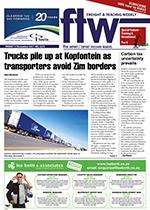As operational pressures increase, new employees often have to hit the ground running, leading to a growing trend to source staff with some occupational training, according to CFR Freight group human resources manager, Laraine Hurst. “In a high-volume, low margins, high-risk industry, staff costs remain the single biggest cost to any freight company – and the pressure to perform is continuous,” she said. And as automation and increasing deployment of technology was driving the industry, traditional roles of employees were changing, with some jobs moving from a semi-skilled environment to a skilled one, she added. CFR sees training as an “important strategic tool” to ensure both personal career growth and company growth, according to Hurst. “Industry learnership programmes are ideal pathways to bring in and develop a talent pool.” She said technical skills were important to CFR’s business, adding that soft skills often enhanced the application of technical competence. Staff shortages in the industry in general include sales and business development staff and key account managers. “These skills can be acquired through job shadowing,” she said. Hurst added that freight staff could take their own initiative by upskilling themselves with courses that added value to their role. “This would always be taken into consideration when future opportunities arise within a company,” she said.

